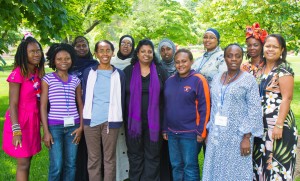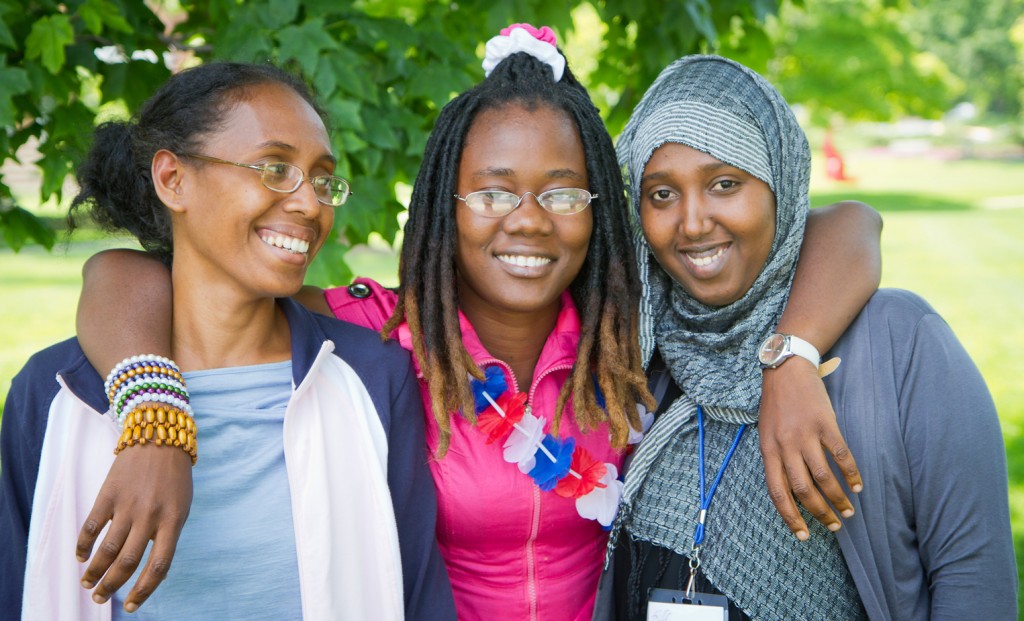Little more than six months after alumna Leymah Gbowee won the Nobel Peace Prize, Eastern Mennonite University (EMU) has hosted its first participants in a program designed to train more women for leadership roles in peacebuilding.
The first group of students in the Women’s Peacebuilding Leadership Program included 12 women from Africa (Liberia, Kenya, and regions in and around Somalia) and the South Pacific (Fiji and Solomon Islands) at the 2012 Summer Peacebuilding Institute under EMU’s Center for Justice and Peacebuilding.
After returning home, the participants will be provided with mentors and will take two additional classes in their respective home regions before earning a graduate certificate. An additional eight Somali women who did not receive visas to attend SPI this year are also enrolled in the program’s first cohort.
“I’m grateful, I’m overwhelmed to be a part of this,” said Gwendolyn Myers, a 21-year-old activist and journalist from Liberia who was selected for the program. “I want to bring this key message to the group: prioritize young people! Young people can contribute positively towards peace and development, if given the chance.”
She said her SPI classes taught her how to analyze and “map” conflicts and to bring all parties involved “to the table,” enabling her to act more strategically in Liberia in the future.
Myers is executive director of Messengers of Peace-Liberia, a nonprofit organization that works with university students and youth to promote peace, reconciliation and a spirit of volunteerism in Liberia.
Hiba Mohamed Ismail, an instructor with the Observatory of Conflict and Violence Prevention in Hargeisa, Somaliland, echoed Myers’ thoughts: “I was so lucky to be chosen.” She spoke of the benefits of being granted a safe, hospitable place to gain wider knowledge while reflecting on the social situation at home.
Ismail trains at-risk youth – many of them homeless, battling drug addictions or recently released from prison – in conflict management and vocational and social skills.
As a follow-up to SPI, experienced leaders in the peace field will act as mentors for each sub-group of women, helping them to integrate their academic training with their day-to-day work.

The Center for Justice and Peacebuilding received more than 100 applications for spots in the first cohort of the women’s leadership program and has already begun planning for future sessions. Working with its funding partners, USAID and the German development organization, EED/Bread for the World, the peacebuilding center is expecting a larger group from the South Pacific next year, and it hopes to bring more Liberian and Somali women as well. Plans are also underway to add a new cohort of women leaders from Burma.
“The leadership of both women and men is vital to developing, implementing and sustaining robust peacebuilding processes at all levels of society,” said Jan Jenner, director of the Women’s Peacebuilding Leadership Program. “More and more organizations and countries are realizing that the participation of women in leadership is vital to their well-being. This program is assisting countries and regions in developing the capacity of women to take up these leadership roles that are so needed.”
Three of the women in the program – Asli Ahmed Mohamoud, Amina Hassan, and Priscilla Singh – spoke appreciatively of having the support of their husbands for their peacebuilding work. In their home regions, it is almost unknown for a husband to care for the children in the family to enable a wife to play a public role, but their husbands have been exceptional. Mohamoud has three children, Hassan has five, and Singh has two.
Mohamoud, employed by CARE International, is the founder of a radio program called “Voice of Women,” which draws on the oral tradition of the Somali community to mobilize women to participate in their country’s peacebuilding process. She also writes a weekly newspaper column to encourage women.
Trained as a schoolteacher, Hassan founded Women for Peace and Development in Mandera, the northeast district of Kenya, in 1998. “Twenty or 25 years ago, you would hardly see a woman participate in activities beyond the family,” she said. “Some changes have been realized.” She said frequently recurring droughts – probably due to climate change – have forced some of the changes. Her people are seeing the end of the tradition of men supporting their families by owning herds of camels and other animals.
“Men are becoming idle and not knowing what to do or where to start over,” she said. Hassan’s group has doled out small loans – “we started with 100 women receiving 5,000 Kenyan shillings (about 60 U.S. dollars)” to empower women to start supporting their families through setting up market stalls and other small businesses.
For her efforts at reducing violent conflict and seeking other ways for her people to survive, Hassan has received the Head of State commendation in Kenya. She is planning to run for a seat in the nation’s parliament.
As the first woman to be elected to local government in her region of Fiji, Singh faced bullying and came to realize that women need to form a “critical mass” in government in order not to feel alone in the “lion’s den.” Singh is working to increase the role of women in the next national election and plans to run for a national office herself at some time in the future.
All of the participants in the Women’s Peace Leadership Program made the point that women and men must be respectful partners if there is to be lasting social change, for the betterment of all. “Promoting leadership for women is also promoting collaborative leadership for men,” said Jenner.
Though they were together at SPI for just a month, these first participants developed strong bonds and friendships, said 26-year-old Philma Zaku, a youth coordinator for the Anglican Church diocese surrounding Honiara, Solomon Islands.
“You’re able to communicate with people who have the same passion … for making the world a better place,” said Zaku, whose job includes a significant focus on reducing and preventing domestic violence against women.
Zaku made a point of linking peace to other issues affecting the Pacific Islands, notably climate change and rising sea levels, which threatened the islands’ very existence.
Lynn Roth, the executive director of EMU’s Center for Justice and Peacebuilding, said he hopes the women’s leadership program marks the beginning of the participants working together over their entire lifetimes, sometimes in collaboration with EMU.
Zaku agreed: “This first cohort of the women’s leadership program is just the beginning of something that must continue for the betterment of the world.”
Other members of the first Women’s Peacebuilding Leadership Program at SPI were: Amal Yasin Ibrahim, who works with the USAID-funded Transition Initiatives for Stability in Somaliland; Windor Dorko, executive director of the Foundation for Human Rights and Democracy in Liberia; Vaiba Flomo, featured in the documentary “Pray the Devil Back to Hell” as one of the founding members of the Women’s Mass Action Campaign in 2003, which was instrumental in ending war in Liberia; Grace Jarsor, who was also one of the founding members of the Women’s Mass Action Campaign in Liberia, works for her government’s Ministry of Gender and Development; Jerolie Belabulie, a monitoring and evaluation officer employed by the Adventist Development and Relief Agency in the Solomon Islands; and Alita Waqabaca, clinical practice leader for Pacific Counseling and Social Services in Fiji.

Great job Bonnie and Andrew! Thanks a lot to the Center for Justice and Peacebuilding @Eastern Mennonite University, VA for all the support. Special thanks to USAID and Gbowee Peace Foundation Africa for supporting the Liberian Women Cohort(LWC).
Thank you, Gwendolyn, for your kind words and for showing, by your example, that it is very important to acknowledge and express appreciation to the agencies that provided the funding for this first cohort of the Women’s Peacebuilding Leadership Program. I regret that this information was not tucked into our article. You were right to thank USAID and the Gbowee Peace Foundation Africa for their support of the Liberian women. The women from the South Pacific nations were supported by Church Development Service (Evangelischer Entwicklungsdienst – EED), an association of Protestant Churches in Germany. The women of Somali origin (from a number of regions, including northeast Kenya and Somaliland) were funded by USAID.
I thank God for your work in peace training for women. I believe the future is with women as
we work at all levels in many areas. I am especially grateful that Somali women are included
in the training. I spent 25 years of my life committed to relating to Somali people. This gives
me great hope!
You have indeed raised my hopes for peace in the world, particularly for Somalia but elsewhere, as well. May God be praised and continue to bless this worthy endeavor.
Thank you to all of you at the Center for Justice and Peacebuilding for this program. What a marvelous initiative!
“The leadership of both women and men is vital to developing, implementing and sustaining robust peacebuilding processes at all levels of society,” so perfectly put! Leadership is a skill that is so necessary to our survival. Being successful in anything requires successful leaders who can in turn bring out the best in those working for a common goal. I read a great book that might be a good resource in leadership training! It’s called “How to Avoid the Common Failure” by Michael Horton. You can find out more on his website http://www.hortonadvantedge.com and you can pick up the book at http://www.gettothepointbooks.com. I hope it helps in your amazing endeavors!